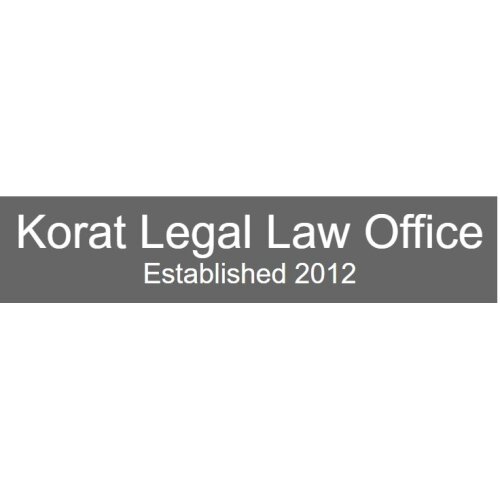Best Merger & Acquisition Lawyers in Nakhon Ratchasima
Share your needs with us, get contacted by law firms.
Free. Takes 2 min.
List of the best lawyers in Nakhon Ratchasima, Thailand
Thailand Merger & Acquisition Legal Articles
Browse our 1 legal article about Merger & Acquisition in Thailand written by expert lawyers.
- Mergers and Acquisitions in Thailand: Legal Considerations and Best Practices
- Mergers and acquisitions (M&A) are important techniques for company expansion, consolidation, and diversification. M&A activity in Thailand has increased as a result of a thriving economy, more foreign direct investment, and a favorable regulatory environment. Lawyers working in M&A transactions must grasp the legal concerns and best practices in order... Read more →
About Merger & Acquisition Law in Nakhon Ratchasima, Thailand
Merger & Acquisition (M&A) law in Nakhon Ratchasima, a key city in Thailand, is part of the broader Thai legal framework governing corporate consolidation and restructuring. The process of M&A involves a wide range of legal, financial, and operational considerations that require careful scrutiny to ensure compliance with local regulations. Nakhon Ratchasima, being an economically vibrant region with diverse industrial sectors, witnesses significant M&A activities. These legal processes are governed by national laws, including the Thai Civil and Commercial Code and the Public Company Act, coupled with local regulations that may have regional specificities. Key M&A activities in Nakhon Ratchasima often involve businesses in manufacturing, agriculture, and increasingly, technology and services sectors.
Why You May Need a Lawyer
Engaging in M&A activities can be complex, with numerous legal nuances requiring professional guidance. Below are common situations where legal help may be necessary:
- Due Diligence: Ensuring thorough investigation and validation of the target company's liabilities and assets.
- Negotiating Terms: Drafting and negotiating key terms and conditions of the merger or acquisition deal.
- Regulatory Compliance: Navigating compliance with both local and national business and competition laws.
- Contractual Obligations: Advising on the structuring of purchase agreements and other contractual documents.
- Dispute Resolution: Handling potential disputes that may arise during or after the M&A process.
Local Laws Overview
The legal landscape for M&A in Nakhon Ratchasima, like elsewhere in Thailand, is largely shaped by several key legislative frameworks:
- Thai Civil and Commercial Code: This code addresses the fundamental principles of contractual agreements within M&A transactions.
- Public Company Act: Governs the structure, acquisition, and merger of public companies in Thailand.
- Competition Act: Prevents anti-competitive practices and monopolies, ensuring fair competition during mergers.
- Foreign Business Act: Regulates foreign ownership in Thai companies, important for cross-border M&A deals.
In Nakhon Ratchasima, specific regulations may also apply to industries that are vital to the local economy, such as agriculture or manufacturing, making local legal expertise essential.
Frequently Asked Questions
What is the typical duration for completing an M&A deal in Nakhon Ratchasima?
The duration can vary widely based on the complexity of the deal, ranging from a few months to over a year. Factors include due diligence, regulatory approvals, and negotiations.
Are there any restrictions on foreign ownership in M&A transactions?
Yes, under the Foreign Business Act, certain businesses in Thailand have restrictions on foreign ownership. It's crucial to check these limitations when engaging in M&A.
How are mergers and acquisitions taxed in Thailand?
M&A transactions can incur various taxes such as corporate income tax, value-added tax (VAT), and possibly transfer taxes, depending on the structure of the deal.
Do merger agreements need to be filed with the government?
Yes, merger agreements and changes in company structure often need to be filed with the Department of Business Development, Ministry of Commerce.
What is due diligence, and why is it important?
Due diligence is a comprehensive appraisal of a business, particularly in financial and legal terms, conducted before entering into a merger or acquisition to understand the associated risks.
Can a merger or acquisition be undone in Nakhon Ratchasima?
While technically possible under certain circumstances such as fraud or misrepresentation, reversing a merger or acquisition is legally complex and rare.
What role does the Trade Competition Commission play in M&A?
The Trade Competition Commission ensures that M&A activities do not result in monopolistic practices and that competition laws are upheld.
How are employee rights affected in a merger or acquisition?
Employee rights can be affected significantly. Thai labor law ensures certain protections, and it's vital to consult legal advisors regarding employee contracts and severance.
What are the common challenges in M&A transactions?
Challenges include regulatory hurdles, unexpected financial liabilities, cultural integration issues, and potential backlash from stakeholders or consumers.
Is it necessary to have a local partner for an M&A deal?
While not legally required, having a local partner can provide valuable insights into regional markets and help navigate local bureaucratic processes more effectively.
Additional Resources
For those seeking further information, the following resources can be invaluable:
- Department of Business Development: Provides information on company registration and corporate compliance in Thailand.
- Trade Competition Commission: Oversees fair trade and competition regulations crucial for M&A.
- Chamber of Commerce, Nakhon Ratchasima: Offers resources and networking opportunities for businesses in the region.
- Professional Legal Firms: Engaging firms specializing in corporate law can provide tailored advice and assistance.
Next Steps
If you are considering or currently involved in a merger or acquisition in Nakhon Ratchasima, it is advisable to consult with a competent legal professional who understands both national and local laws. Here are steps you can take:
- Research and identify law firms with a specialization in M&A and a strong presence in Nakhon Ratchasima.
- Schedule consultations to discuss your specific M&A needs and objectives.
- Consider hiring a local advisor or partner to bridge cultural and regulatory gaps effectively.
- Stay informed on local economic trends that may affect your industry and potential merger or acquisition targets.
This planned approach can help facilitate a smoother M&A process, ensuring all legal and regulatory requirements are met effectively.
Lawzana helps you find the best lawyers and law firms in Nakhon Ratchasima through a curated and pre-screened list of qualified legal professionals. Our platform offers rankings and detailed profiles of attorneys and law firms, allowing you to compare based on practice areas, including Merger & Acquisition, experience, and client feedback.
Each profile includes a description of the firm's areas of practice, client reviews, team members and partners, year of establishment, spoken languages, office locations, contact information, social media presence, and any published articles or resources. Most firms on our platform speak English and are experienced in both local and international legal matters.
Get a quote from top-rated law firms in Nakhon Ratchasima, Thailand — quickly, securely, and without unnecessary hassle.
Disclaimer:
The information provided on this page is for general informational purposes only and does not constitute legal advice. While we strive to ensure the accuracy and relevance of the content, legal information may change over time, and interpretations of the law can vary. You should always consult with a qualified legal professional for advice specific to your situation.
We disclaim all liability for actions taken or not taken based on the content of this page. If you believe any information is incorrect or outdated, please contact us, and we will review and update it where appropriate.









